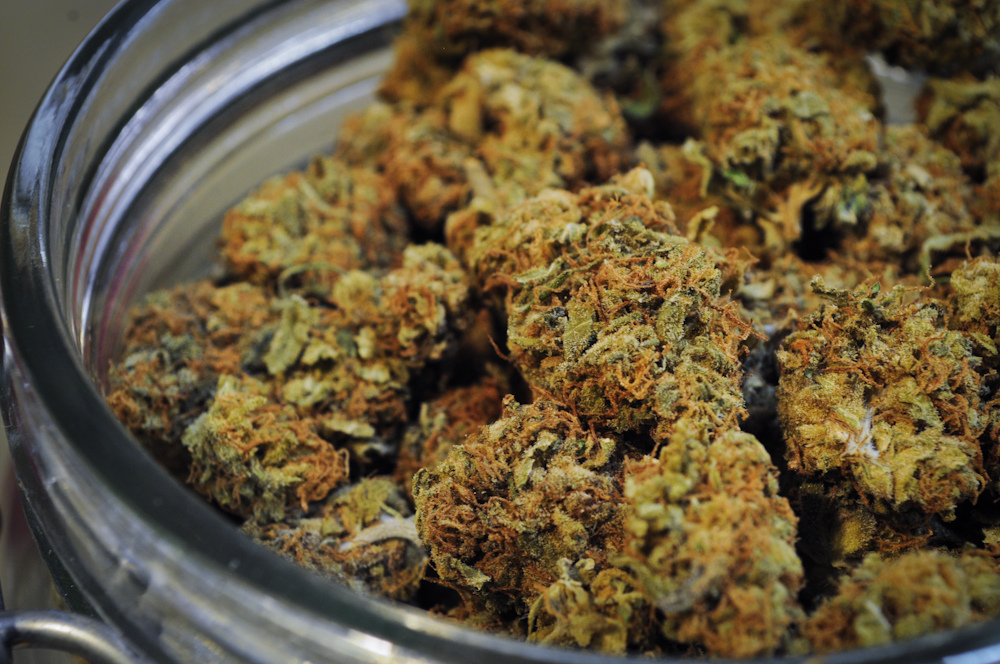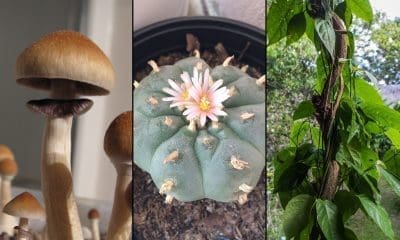Politics
Virginia Lawmakers Don’t Expect Governor To Sign Marijuana Sales Bill

Though a bill to legalize and regulate retail cannabis sales in Virginia has been passed by the legislature and is now awaiting action by Gov. Glenn Youngkin (R), supportive lawmakers now say they believe it is unlikely the proposal will become law this session.
Reached for comment on Wednesday, the legislation’s sponsor in the House, Del. Paul Krizek (D), told Marijuana Moment that from the governor’s statements in the press, “it seems pretty clear that he is not a fan of a legally regulated retail market.”
“He even said something to the effect that that he would not want a cannabis store on every street corner,” Krizek added—a hypothetical the lawmaker said was “not at all accurate and the opposite of what our bill would allow.”
On Tuesday, Sen. Creigh Deeds (D) relayed to local media that Youngkin isn’t interested. “We were advised that the governor wasn’t going to sign the [cannabis market] bill under any circumstance,” he said, according to WRIC.
The legislation, SB 448 in the Senate and HB 698 in the House, was formally transmitted to Youngkin’s desk on Monday. He has through April 8 to act on the bill. His options are to sign it into law, veto it, allow it to become law without his signature or return it to lawmakers with suggested amendments.
Already the governor has vetoed one of the several marijuana-related measures passed by lawmakers this session, standing in the way of a bipartisan measure that would have protected the parental rights of lawful marijuana users. Though that proposal repeatedly passed the Senate on unanimous or near-unanimous votes, Youngkin’s veto message criticized it for “aiming to address a non-existent problem”—a claim advocates have said is untrue.
As for the legal sales bill, Youngkin has repeatedly—albeit nebulously—signaled that he’s not on board.
In January, for example, the governor said he didn’t have “any interest” in moving forward with the Democrat-led cannabis plans. Late last month, his press secretary reiterated those comments in a message to Marijuana Moment.
“I would refer you back to the Governor’s comments during the gaggle after the State of the Commonwealth,” Christian Martinez said in an email, “where he said he doesn’t have a lot of interest in pressing forward with marijuana legalization.”
At one point earlier this session, it appeared the retail cannabis bill could become part of a grand deal between Youngkin and legislative Democrats. In December, Senate President Pro Tempore Louise Lucas (D) alluded to a compromise involving a sports stadium project the governor supported. But that deal never materialized and Democrats left the governor’s proposed area plan out of budget legislation.
Deeds held out the possibility that he “might be surprised” by Youngkin’s approach to the marijuana sales bill when he does act, but added that “the only way the arena was happening would have been through a compromise on Democratic priorities, and lots of Democratic priorities were not on the table.”
Krizek, in his comments to Marijuana Moment this week, said that “it’s hard to know what the governor’s plan was.”
“He may or may not have been contemplating including it in his sports arena deal,” he said.
Use, possession and limited cultivation of cannabis by adults is already legal in Virginia, the result of a Democrat-led proposal approved by lawmakers in 2021. But there’s nowhere for adults to legally buy the drug. Illicit stores have thus sprung up to meet consumer demand, with some estimates valuing the unregulated market at roughly $3 billion.
“The real issue is eradicating the illicit market,” Krizek said, reiterating comments he made on the House floor before his bill passed:
“The fact of the matter is that drug dealers don’t ID. They’re not checking for age. Those products aren’t lab tested for purity or potency. They don’t accurately label them. And they don’t use childproof packaging. This bill mandates all of those things. We need to bring this into a regulatory framework that will protect our children and our commonwealth, and that’s what I’m trying to do here.”
“I stand by that statement,” Krizek said Wednesday. “That should be reason enough to sign the bill.”
On Wednesday, a spokesperson for the governor told Marijuana Moment that he would “point you to what Governor Youngkin said at a gaggle in front of the Capitol steps on Thursday March 8th.”
In those comments, which the staffer excerpted, the Youngkin stated, “I don’t have any interest in the cannabis legislation. I’ve expressed that to people over and over again.”
Here’s what the retail sales legislation would do if it becomes law:
- Retail sales could begin as of May 1, 2025.
- Adults would be able to purchase up to 2.5 ounces of marijuana in a single transaction, or up to an equivalent amount of other cannabis products as determined by regulators.
- A state tax of 11.625 percent would apply to the retail sale of any cannabis product. Of that, 8 percent would go to the state, local governments would get 2.5 percent and 1.125 percent would fund schools.
- The Virginia Cannabis Control Authority would oversee licensing and regulation of the new industry. Its board of directors would have the authority to control possession, sale, transportation, distribution, delivery and testing of marijuana.
- Local governments could ban marijuana establishments, but only if voters first approve an opt-out referendum.
- Locations of retail outlets could not be within 1,000 feet of another marijuana retailer.
- Cultivators would be regulated by space devoted to marijuana cultivation, known as canopy size. Both indoor and outdoor marijuana cultivation would be allowed, though only growers in lower tiers—with lower limits on canopy size—could grow plants outside. Larger growers would need to cultivate plants indoors. Secure greenhouses would qualify as indoor cultivation.
- Only direct, face-to-face transactions would be permitted. The legislation would prohibit the use of other avenues, such as vending machines, drive-through windows, internet-based sales platforms and delivery services.
- Existing medical marijuana providers that enter the adult-use market could apply to open up to five additional retail establishments, which would need to be colocated at their existing licensed facilities.
- Serving sizes would be capped at 10 milligrams THC, with no more than 100 mg THC per package.
- No person could be granted or hold an interest in more than five total licenses, not including transporter licenses.
- People with convictions for felonies or crimes involving moral turpitude within the past seven years would be ineligible to apply for licensing, as would employees of police or sheriff’s departments if they’re responsible for enforcement of the penal, traffic or motor vehicle laws of the commonwealth.
- An equity-focused microbusiness program would grant licenses to entities at least two-thirds owned and directly controlled by eligible applicants, which include people with past cannabis misdemeanors, family members of people with past convictions, military veterans, individuals who’ve lived at least three of the past five years in a “historically economically disadvantaged community,” people who’ve attended schools in those areas and individuals who received a federal Pell grant or attended a college or university where at least 30 percent of students are eligible for Pell grants.
- “Historically economically disadvantaged community” is an area that has recorded marijuana possession offenses at or above 150 percent of the statewide average between 2009 and 2019.
- Tax revenue from the program would first cover the costs of administering and enforcing the state’s cannabis system. After that, 60 percent of remaining funds would go toward supporting the state’s Cannabis Equity Reinvestment Fund, 25 percent would fund substance use disorder treatment and prevention, 10 percent would go to pre-K programs for at-risk children and 5 percent would fund a public health and awareness campaign.
- Adults could also share up to 2.5 ounces with other adults without financial remuneration, though gray-market “gifting” of marijuana as part of another transaction would be punishable as a Class 2 misdemeanor and a Class 1 misdemeanor on second and subsequent offenses.
- A number of other new criminal penalties would be created. Knowingly selling or giving marijuana or marijuana paraphernalia to someone under 21, for example, would be a Class 1 misdemeanor, punishable by up to a year in jail and a maximum $2,500 fine, as would knowingly selling cannabis to someone reasonably believed to be intoxicated. It would also be a Class 1 misdemeanor to advertise the sale of marijuana paraphernalia to people under 21.
- Knowingly obtaining marijuana on behalf of someone under 21 would be a Class 1 misdemeanor.
- People under 21 who possess or use marijuana, or attempt to obtain it, would be subject to a civil penalty of no more than $25 and ordered to enter a substance use disorder treatment and/or education program.
- Illegal cultivation or manufacture of marijuana, not including legal homegrow, would be a Class 6 felony, punishable by up to five years imprisonment and a $2,500 fine.
- People could process homegrown marijuana into products such as edibles, but butane extraction or the use of other volatile solvents would be punishable as a Class 1 misdemeanor.
Other cannabis-related bills before the governor include a proposal to resentence people serving time for past cannabis offenses and protect public-sector workers from employment discrimination based on lawful medical marijuana use.
A sales bill did advance through the Democratic-controlled Senate last session, but it stalled in committee in the House, which at the time had a GOP majority.
Virginia Lawmaker Slams Governor For Vetoing Bill To Protect Marijuana Consumers’ Parental Rights
















